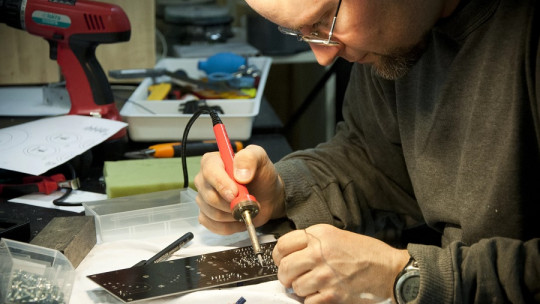Unfortunately, we do not have a culture of preparedness. That is why in this article I will explain how to prepare your children for success, providing them with vocational guidance.
There are those who hope that their children will be outstanding, find their vocation, love studying, become intellectuals and millionaires, only with their good intentions. That is why in this article I will explain how to prepare your children for success, giving them a vocational orientation since we were kids.
I am often asked: At what age is it appropriate to encourage children’s love of learning and seeking their vocation? The answer is simple! As soon as possible! As soon as develop their capabilities of communication, and that they begin to show interest in the world around them, since the children’s mind It is open to receive what we deposit in it, and when not we fill it with positive things we leave the door open for full of negative things.
That is why in this article you will learn how to prepare them in each stage of development From when they are little to when they are older!
It is important to first understand the current labor and economic situation in the world. It’s not like the 80s, where having good grades and a university degree assured you a bright future in professional and economic terms. Before it didn’t matter how mediocre a professional was, his purchasing power He was far superior to the majority of those who did not study. But this is no longer the case, in some countries like Mexico, a taxi driver, who does not really need further academic preparation, can earn more than the average earned by the majority of university graduates. While, in countries like the United States, many young people and their families carry immense university debts only so that the kids do not always take advantage of their degree. The same happens in Spain.
Keys to finding your children’s vocation
I mention all this so that you become aware of how important it is to find the Vocation for the children, since being a mediocre professional no longer ensures economic stability, therefore, it is better to guide the children to a future where they can exploit their potentials and tastes and therefore have more possibilities of excelling, regardless of whether it is a job for which you need to go to university or not.
In the first two stages of development, that is, from 0 to 3 years old, and then from 3 to 6 years old, no one doubts that for these little ones it is very important play, have fun, and be free of worries However, when we accustom them only to this we cannot complain later if they do not want to help at home or refuse to work at school, since it is the parents themselves who accustomed them to a life “only” of fun, and then they They want to change the play. To avoid this, it is best to prepare them from a young age to make an effort, giving them small tasks. Obviously, they will not help them much, sometimes it will be more work that they generate, but the great virtue is that the younger they start doing it, they will see it as a game and when they are older and have to work at school or help in home, they will already be used to it and it won’t seem strange at all.

In fact, there are many 1 or 2 year old children who alone try to help at home or work, or do things that are not simply play; but parents prevent them either because they know that they will not do it well and prefer to do it themselves, or because they think… “it is my obligation as a mother or father, to serve them”, and then they pay the consequences of instilling in them from a young age the don’t try hard for nothing and expect others to fix everything.
Some may complain that older children find studying boring, but what can we expect? If they are used to what is easy, what is not requires mental effort Curiously, when they are in the first two stages, which are the two mentioned above, children do want to learn and ask all the time: why this? And what is that for? But what do some adults usually say? “Shut up son, daughter, you look like a parakeet.”
Stimulating their curiosity from a young age
The first two stages are ideals not only to answer your questions, but to explain the wonders of the world to which they have just arrived. Talking to them about animals, stars, plants, the human body, playing games where they are told to use letters, reading maps, etc., are things that children will love, will educate them and, above all, will develop a taste for learn. This is not to mention that when they see these topics at school they will find it a little easier.
This is important because to a large extent the rejection or love for studying It depends on how easy or difficult it is for the child to learn, that is why there are so many children who hate studying because at home there is no stimulation of learning disguised as games, and this is why they see learning as something negative because they associate it with boring tasks. and scolding.
Finding the calling
The objective of the third stage of development that goes from 6 to 12 years, in terms of vocational orientation is to show them the range of possibilities and experience activities that the world offers them. Look, when you ask a child “What do you want to be when you grow up?”, they don’t go beyond basic answers like doctor, psychologist, lawyer, etc. This is because they actually know very few professions and most likely, their vocation is in a job that they don’t even know exists. That is why it is important to open your eyes at this stage. For example, talking to them about various professions.

Many people may think that taking children to different courses It is a good idea and in fact, yes it is, but it is neither the only nor the best, partly because it usually stays with the same courses as always: karate, dance, swimming, etc., so it does not open either much the “perfection” of children.
Instead, it can do activities at home how to make a plan or a model like an architect, you can identify plants like a biologist, you can also play to make a simple program on the computer like a software programmer, etc. In short, they are activities that do open the child’s eyes and really do not require so much effort, money or time. Additionally, I suggest asking for support from family and friends.
In the fourth stage that corresponds from 12 years to 18, that is, in adolescence and that in this topic would end until consolidate labor The values planted in the first two stages and the experiences of the third are taken to begin making efforts to consolidate the future of work. It is not appropriate to wait until they are at university to start preparing, much less wait until they finish their studies to gain experience. As soon as the path is clear, you have to start walking it. That is, direct your effort!
The best way to test a young person’s vocation is to allow them to work on their own to develop it. In closing, it is necessary to understand that not all children have to be erudite professionals or millionaires, each human being comes to experience different things, therefore if you as a father or mother made an effort to give opportunities to your child and in the end After all, he doesn’t want to fight to excel in the workplace, it’s okay, you did your job, which is to give him the tools while what he or she does with the tools you give them is their own thing, since the children are not there for us to project ourselves onto them.









